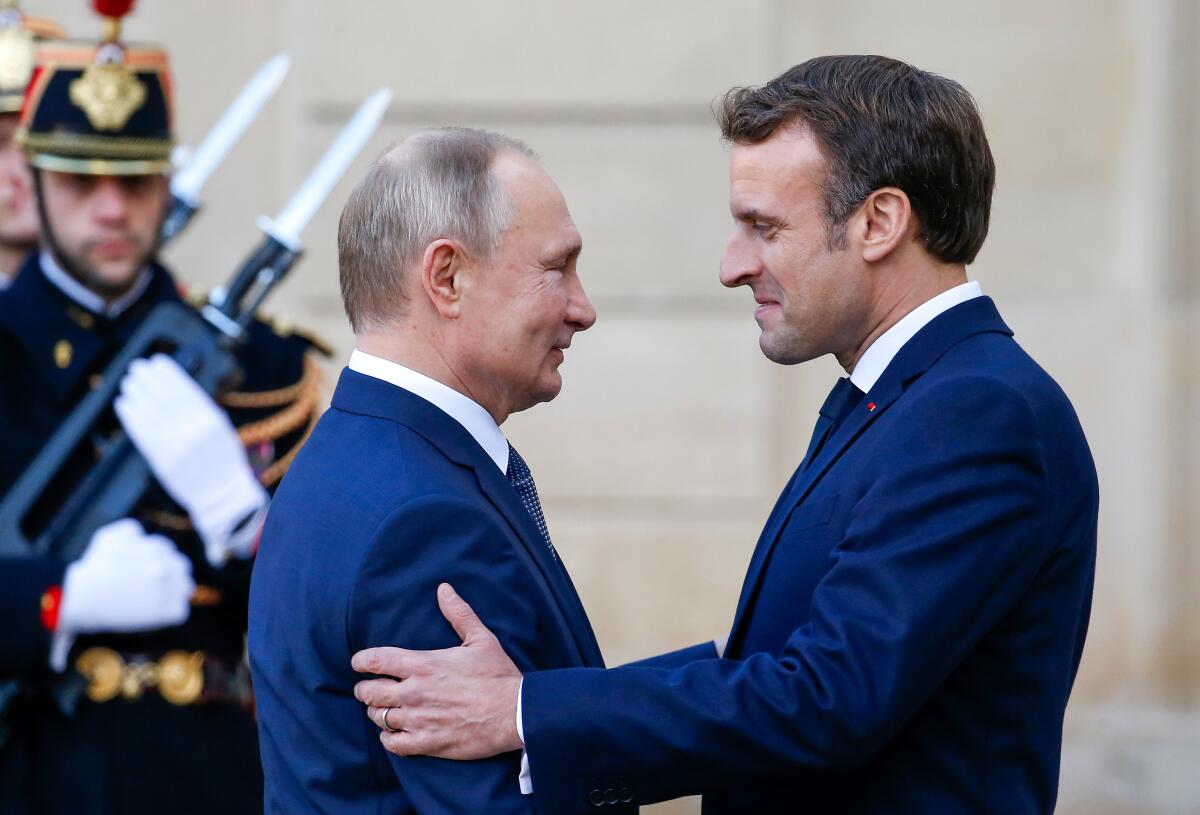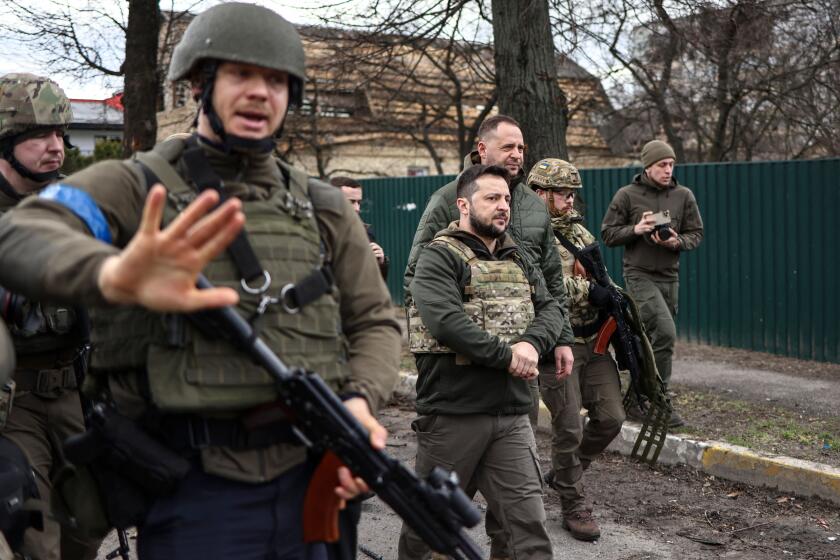France’s Macron wins praise for Russia diplomacy, but is Putin playing him?

- Share via
PARIS — Official photographs of French President Emmanuel Macron usually depict him looking composed and confident. But in recent pictures released by Elysee Palace after his talks with Russian President Vladimir Putin, Macron looks drawn, haggard, even despairing.
The messaging seems clear: Dealing with Putin is taxing. But it’s election season in France, and Macron’s shouldering of a difficult statesmanlike task — talking with a volatile Russian leader who is waging Europe’s biggest land war since 1945 — appears to be paying political dividends for the 44-year-old French president.
Macron, perhaps more than any other Western head of state, has engaged intensively with Putin for years — including during the run-up to the war in Ukraine, and continuing during the more than two weeks since the start of the massive Russian offensive.
After his latest parley with Putin last week, Macron appealed for a “complete truce” in what has become an all-out Russian assault on Ukrainian cities and towns. France, he said, was committed to protecting civilians and would continue to apply “diplomatic pressure, so that this war stops as soon as possible.”
A woman reacts as she stands in front of a house burning after being shelled in the city of Irpin.
In part because it bolsters France’s image as a major world player, the French public is generally happy to see the country’s leader take on a high-profile diplomatic role.
“In France, it goes down fairly well with citizens if the president is seen to be playing an active role on the international stage,” said Douglas Webber, emeritus professor of political science at INSEAD, an international business school headquartered in France.
That boost comes just in time for next month’s two-round presidential election. A report published this week by the Elabe pollster for BFM television indicated that one-third of those surveyed planned to vote for Macron in the first round, a jump of more than 8 percentage points from the previous week.
Far-right candidate Marine Le Pen trailed, with 15% of the intended votes. That gives Macron the biggest first-round lead heading into a presidential vote since 1965, according to Mujtaba Rahman, the Eurasia Group’s managing director for Europe.
Even so, Macron has come under fire in some quarters for his longtime efforts to engage with Putin to the point of courting him. The French president’s supporters call it a laudable effort to keep the lines of communication open with an autocratic leader often hostile to the West; his detractors suggest Macron may have been taken in by the wily former KGB officer.
“For a long time, he didn’t understand Putin,” said Michel Duclos, senior fellow at Institut Montaigne. “He was under the illusion that Putin was a rational actor and had security interests that one could understand.”
But after a visit to Moscow by Macron weeks before Putin launched his Ukraine invasion on Feb. 24, the French leader sought to make it known that he had a clear-eyed grasp of just how far the Russian leader might be willing to go in his bid to subdue Ukraine.
“Macron well understood that there was a different person sitting across from him,” Duclos said.
While Macron wasn’t able to dissuade Putin from invading, some veteran observers believe his ongoing contact provides a useful window into the Russian leader’s thinking.
“Macron wanted to use diplomacy to determine Putin’s intentions,” said Judy Dempsey, nonresident senior fellow at Carnegie Europe and editor in chief of Strategic Europe. “He has no illusions, but as a leader, he felt a certain responsibility to try.”
The desire to keep lines of communication open, even with interlocutors whose goals might be considered repugnant, is a classically French one, said Olivier Costa, research professor at the French National Center for Scientific Research and an expert on French politics.
“There is a French tradition that goes back to [Charles] de Gaulle of France finding its own way between two blocs,” Costa said. “The idea is that someone should speak to the Russians. [Macron] has always said that someone needs to speak to Putin.”
But, Costa acknowledged, “not everyone is of that view.”
Macron has also been in regular contact with Ukrainian President Volodymyr Zelensky, expressing emphatic support for the Ukrainian side, but his outreach has been far more weighted toward Moscow. At times he has sought to serve as a bridge between the two sides, as when he spoke with both Putin and Zelensky on Feb. 28, four days after Russia invaded, and said he pressed for an immediate cease-fire.
A shift in emphasis from domestic politics to a pressing international crisis is clearly benefiting Macron. Just weeks ago, his political opponents were busy criticizing his immigration policies and his government’s handling of the COVID-19 pandemic.
Now, public discourse is centered on the war in Ukraine, which has triggered an enormous refugee exodus and caused heart-rending harm to starving, freezing, bombarded Ukrainian civilians.
“No other candidate has an international profile,” Costa said. “He is strategically playing that role and underlining the international dimension to show how weak the other candidates are.”
Moreover, three of Macron’s leading rivals in the upcoming election — Le Pen, Éric Zemmour on the extreme right and Jean-Luc Mélenchon on the hard left — are in an extremely awkward position vis-a-vis Putin, having publicly praised him or taken Russian money.
Zemmour recently called Putin’s demands “completely legitimate,” and last week, Le Pen had to destroy fliers that featured a photo of her shaking Putin’s hand. Mélenchon, for his part, has been trying to explain away previous statements he made in support of Putin, most notably concerning Syria.
The discomfit of his rivals has been a political gift to Macron.
“At the moment, he is making hay,” Dempsey said.
France currently holds the European Union’s rotating presidency, so Macron is positioned to speak more broadly for Europe as well. The Ukraine crisis dovetails neatly with the French leader’s long-standing wish to shake up the EU, moving away from wielding mainly soft power and toward ramping up the bloc’s defense and security capabilities.
While there was some support for that point of view, it had been largely theoretical until war in Ukraine, analysts say. Now the more muscular approach advocated by Macron looks prescient.
“There has been a change of mind-set in the EU about becoming a power,” Costa said. “Ukraine is an occasion to say, ‘Now we need to do something.’”
The bloc is taking steps no one would have anticipated six months ago; for example, buying and delivering $500 million worth of weapons to Ukraine, a historic first.
Macron is also riding a wave of almost unprecedented alignment within Europe over Ukraine.
Sweden abandoned its rule of neutrality and sent tanks to the defenders. Germany, in a momentous about-face, reversed its long-standing policy of not sending arms to conflict zones. Even Switzerland, whose confidential banking policies make it a haven for parking ill-gotten gains, joined in sanctions and signaled willingness to freeze Russian oligarchs’ accounts.
Even if Macron has little to show so far in his dealings with Putin, his associates express confidence that he is well positioned to play a role in any negotiated settlement — distant though that prospect may seem.
And the French leader has not minced words when it comes to denouncing what he considers bad-faith actions on Putin’s part, such as when Russia offered evacuation routes for Ukrainian civilians — but wanted to direct those fleeing the bombardment into Russia or its ally Belarus.
“All this is not serious,” Macron said in a broadcast interview. “It is moral and political cynicism, which is unbearable to me.”
More to Read
Sign up for Essential California
The most important California stories and recommendations in your inbox every morning.
You may occasionally receive promotional content from the Los Angeles Times.











